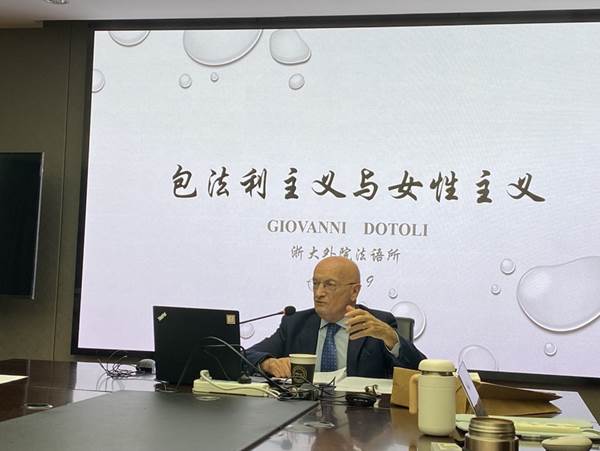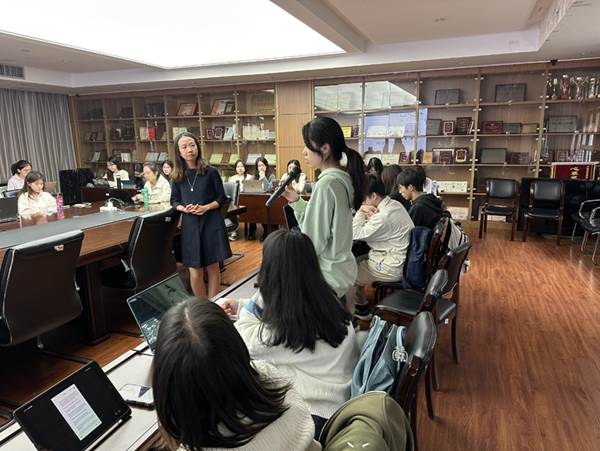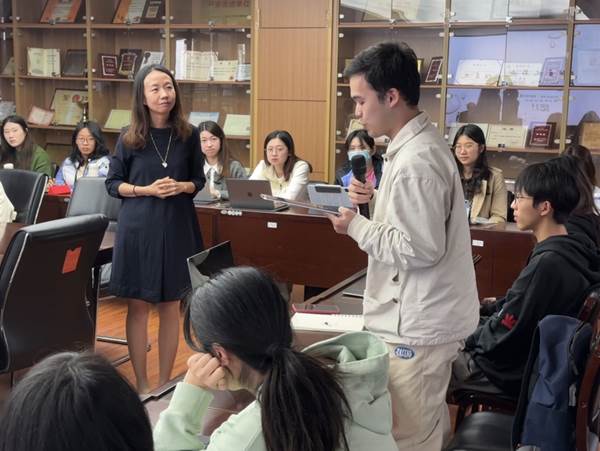On the morning of November 9, 2023, a lecture entitled “Bovarism and Feminism”, held by the Institute of French Language and Culture of the School of International Studies online-cum-offline, attracted a large audience.
At the beginning, the moderator, Ms. SHI Yeting, introduced the speaker, Giovanni Dotoli. As a renowned scholar on French literature, he has published a large number of monographs, papers and essays on French literature and culture from the 16th to the 20th centuries, Mediterranean Francophone writing, and Quebec literature.

Then, Prof. Dotoli began his lecture with a brief introduction to the classic French novel Madame Bovary and offered several reading perspectives. He emphasized that Gustave Flaubert drew upon a wealth of academic research and conducted a meticulous study on customs while writing this novel. Therefore, his work can be seen as an inheritance and development of Balzac’s writings to some extent. Prof. Dotoli then analyzed the connotation of “Bovarism”. He argued that the key to understanding it lies in two key characteristics of the heroine Emma, one being her way of looking at the world, and the other her passion for reading. Emma always cast a poetic eye on the world and immersed herself in the imaginary literary world. Unlike other scholars, Prof. Dotoli believed that “Bovarism” carries a positive meaning as it refers to the attempt to escape the constraints of reality and the pursuit of dreams and an ideal world. For Prof. Dotoli, as a pioneering figure of feminism, Emma reflected the predicament and aspirations of women. Rooted in the crisis of symbolism, this novel revealed a certain sickness of society at that time, foreshadowing the beginning of modernity. Furthermore, Emma was both a female image and a symbol of the universal fate of humanity—the pursuit of ideals and the impossible. Prof. Dotoli also gave a comprehensive and in-depth interpretation of “Bovarism” and Emma through Baudelaire’s The Flowers of Evil, Nietzsche’s works, the psychoanalytic theories of Freud and Lacan, and the text theory of Roland Barthes. In particular, he pointed to the emergence of a “Neo-Bovarism” in the current Internet age, i.e., a state of dissatisfaction with life and an obsession with imagination. In his view, however, all of these have a positive meaning.


In the Q&A session, students had a heated discussion with Prof. Dotoli on various topics concerning Madame Bovary, such as sensibility and sense, the pessimistic tendency, fantasy and vulnerability. Prof. Dotoli praised the students for their critical thinking and good questions, which he later answered one by one. The lecture was concluded in applauses.
Institute of French Language and Culture
Translated by ZHANG Xiaoran and CHEN Yuqing, Proofread by XU Xueying



